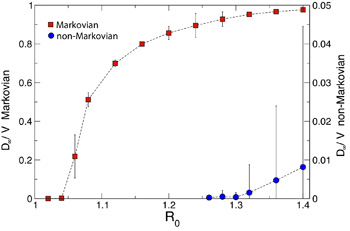publications, news
New publication on the epidemiological effects of time spent at destination by travelers Sept. 15, 2013
A new paper about human mobility and the impact of time spent at destination by traveling individuals in epidemic models has been just published in the Journal of Theoretical Biology.
In the article:
Human mobility and time spent at destination: Impact on spatial epidemic spreading.
C Poletto, M Tizzoni and V Colizza
Journal of Theoretical Biology, 338:41-58 (2013) doi: 10.1016/j.jtbi.2013.08.032.
we present a detailed analysis of the interesting features that appear when a non-Markovian mobility is considered in a spatially structured epidemic model. We use the theoretical framework, already introduced in our previous work (Scientific Reports 2,476 2012), that takes into account the heterogeneous distribution of the length of stay of travelers and we compute the global epidemic threshold at the metapopulation level. Additionally, our framework allows us to study the effect of changes in the traveling behavior in response to the infection, by considering a scenario in which sick individuals do not leave their home location. Finally, we compare the results of our non-Markovian framework with those obtained with a classic Markovian approach and find relevant differences between the two, in the estimate of the epidemic invasion potential, as well as of the timing and the pattern of its spatial spread. These results highlight the importance of properly accounting for host trip duration in epidemic models and open the path to the inclusion of such an additional layer of complexity to the existing modeling approaches.

Comparison between the Markovian and the non-Markovian mobility dynamics. Fraction of infected cities as a function of R0 on a heterogeneous network with power-law degree distribution. The curve corresponding to a non-Markovian model is compared with the case of a Markovian mobility dynamics, where the traffic volume along each link is equal in both cases. Using a Markovian dynamics epidemics spread much more easily.
Posts by category: awards/honors, news, outreach, publications, research, talks, team news



